Search the Special Collections and Archives Portal
Search Results
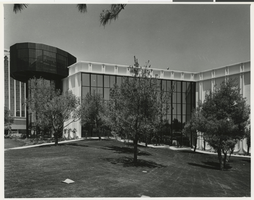
Photograph of the Aladdin theatre for the performing arts exterior (Las Vegas), 1970s
Date
Archival Collection
Description
The Aladdin Theatre for the Performing Arts from the side. Handwritten inscription on back of photo: "Side view Theatre of Perf. Arts Aladdin"; LV News Bureau photo #34514."
Site Name: Aladdin Hotel
Address: 3667 Las Vegas Boulevard South, Las Vegas, NV
Image
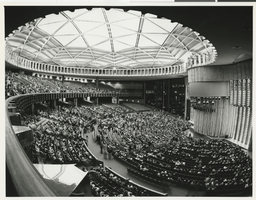
Photograph of the Aladdin theatre for performing arts interior (Las Vegas), 1970s
Date
Archival Collection
Description
An interior view of the Aladdin Theatre for the Performing Arts. Handwritten inscription on back of photo: "Interior- Theatre of the Performing Arts, Aladdin."
Site Name: Aladdin Hotel
Address: 3667 Las Vegas Boulevard South, Las Vegas, NV
Image
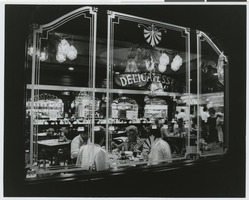
Photograph of delicatessen in the Aladdin Theatre of the Performing Arts (Las Vegas), circa 1972
Date
Archival Collection
Description
Patrons dining in the delicatessen in the Aladdin Theatre of the Performing Arts. Handwritten inscription on back of photo: "Interior- Theatre of the Performing Arts, Aladdin."
Site Name: Aladdin Hotel
Address: 3667 Las Vegas Boulevard South, Las Vegas, NV
Image
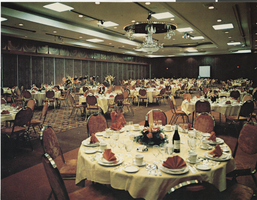
Photograph of interior of the Aladdin Hotel convention area (Las Vegas), 1970s
Date
Archival Collection
Description
A conference room in the convention area of the Aladdin Hotel. Handwritten inscription on photo: "Convention Area Aladdin Hotel."
Site Name: Aladdin Hotel
Address: 3667 Las Vegas Boulevard South, Las Vegas, NV
Image
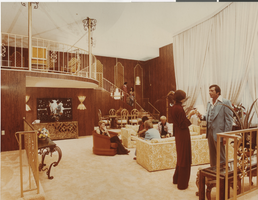
Photograph of guests in a "super suite" at the Aladdin (Las Vegas), 1970s
Date
Archival Collection
Description
Aladdin Hotel's Super Suite, Room 2740. Handwritten inscription on original: "Convention Area Aladdin Hotel."
Site Name: Aladdin Hotel
Address: 3667 Las Vegas Boulevard South, Las Vegas, NV
Image
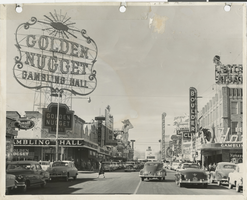
Photograph of the front exterior of the Golden Nugget and Fremont Street (Las Vegas), circa 1951
Date
Archival Collection
Description
Golden Nugget at 129 Fremont Street, circa 1951. Also visible are the Frontier Club, the Vegas Club, the Vegas Vic sign, Union Plaza, the Boulder Club, and Hotel Apache. Note: photograph is damaged.
Site Name: Fremont Street
Address: Fremont street, Las Vegas, NV
Image
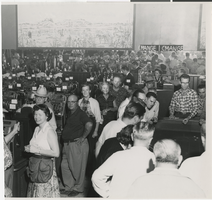
Photograph of the interior of the Boulder Club (Las Vegas), August 1953
Date
Archival Collection
Description
Casino area of the Boulder Club. Transcribed from original: "Inside the old Boulder Club on Fremont St. Now part of the Horseshoe taken from the bar area looking East. In the front Louise (Goble) Meehan, change girl."
Site Name: Boulder Club
Address: 118 East Fremont Street
Image
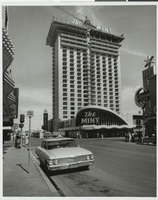
Photograph of the front exterior of the Mint (Las Vegas), 1966
Date
Archival Collection
Description
The Mint Hotel with its tower nearing completion. Stamped on original: "Las Vegas News Bureau. Las Vegas, Nevada. Convention Center. 11940. Don English. Jerry Abbott. Joe Buck. Milt Palmer. John Cook." Also visible is the California Club.
Site Name: Mint Las Vegas
Address: 128 East Fremont Street
Image
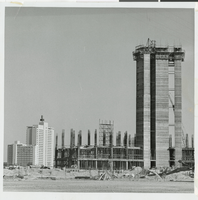
Photograph of the exterior of the International Hotel under construction (Las Vegas), 1968
Date
Archival Collection
Description
The International Hotel under construction with the Sahara visible in the background. The International Hotel was renamed the Las Vegas Hilton in 1971, and again renamed as LVH - Las Vegas Hotel and Casino in 2012.
Site Name: International Hotel
Address: 3000 Paradise Road
Image
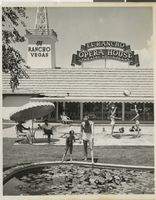
Photograph of the pool and pond at the El Rancho Vegas (Las Vegas), 1950s
Date
Archival Collection
Description
Guests relaxing at the pool and near the pond at the El Rancho Vegas. Stamped on original: "Las Vegas News Bureau. Las Vegas, Nev. - P.O. Box 28. Photographers: Don English. Jerry Abbott. Joe Buck. Milt Palmer."
Site Name: El Rancho Vegas
Address: 2500 Las Vegas Boulevard South
Image
